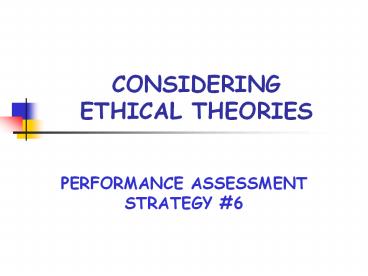CONSIDERING ETHICAL THEORIES - PowerPoint PPT Presentation
1 / 30
Title: CONSIDERING ETHICAL THEORIES
1
CONSIDERING ETHICAL THEORIES
- PERFORMANCE ASSESSMENT STRATEGY 6
2
DO THEORETICAL PERSPECTIVES PROVIDE US WITH THE
RULES OR EFFECTIVE PRINCIPLES NEEDED TO LIVE
AN ETHICAL LIFE?
3
PERFORMANCE ASSESSMENT STRATEGY 6
- Now its your turn
- What aspects of the theories weve discussed
could help you think more fully about ethical
dilemmas? - What aspects of the theories do you reject
outright? Why?
4
Lawrence KohlbergMorality goes well beyond
rule-making following rules, in fact, is the
easy way out keeps us safe
5
TIBETAN PROTEST
VIDEO LINK
6
UTILITARIANMust consider the greatest good
for the greatest number Moves away from
rule-following (to a degree) to focus on
justice/equality
7
So, how do we decide right action?Thats your
challenge in Performance Assessment Strategy 6.
8
TELEOLOGICAL THEORIES
- The consequences (as opposed to motives or
intentions) determine an acts worth or
correctness. That is, the rightness or wrongness
of an act can be judged by the result.
9
DEONTOLOGICAL THEORIESRule or law
centeredWhat is right and what is wrong does
not depend on outcome but on principles or rules
applied in making the decision
10
Think of a situation where such a perspective
might be acceptable and one where it might be
totally unacceptable
11
IS UTILITARIANISM (THE GREATEST GOOD FOR THE
GREATEST NUMBER) TOO SIMPLISTIC TO BE RIGHT???
12
Might we not also consider relationshipsCredito
r to DebtorParent to ChildCitizen to Citizen
13
Prima Facie Duty Presumption That Duty Exists
- A parent must care for a child.
- A workermust go to work and do a fair days work
for a fair days pay. - A citizenmust not dump oil down the storm drain.
14
But how does one WEIGH prima facie obligations
against each other?Indeed, we experience
COMPETING interests and obligations.
15
Privacy
National Security
16
W. D. ROSS
- No general rules
- can be laid down
17
ARISTOTLE
- Practical wisdom/
- Intellectual wisdom
18
ARISTOTLE
- Recall the truths we have learned, inspect
them, make sense of them practical wisdom
19
We have obligations in our community to our
employer, our nation, our family and we must
balance these competing values, yes?
20
THOMAS NAGEL
- A reasoned capacity exists for balancing values.
21
Aristotle, Nagel, Ross all agree we can reason
- We can reason rationally, though, without
rules - Others argue If we can reason, shouldnt we be
able to make these reasons explicit? Shouldnt we
be able to come up with the rules?
22
OBLIGATIONS, RIGHTS, JUSTICE, DUTY ALL CONFLICT
CONSTANTLY IN MEDICAL RESEARCHPOLITICSPERSONA
L LIFE
23
Obviously, centuries of philosophical debate have
not brought consensus on what constitutes ethical
decision-making!
24
THE ABILITY TO FORMULATE EXPLICIT RULES IN
PRINCIPLE IS PRETTY THIN!
25
DO WE LEARN LANGUAGE BY LEARNING THE RULES?
26
DO WE NOT LEARN MUSIC, LANGUAGE, BLACKSMITHING,
AND ETHICS BY MASTERING BODIES OF PRACTICE RATHER
THAN BY LEARNING SPECIFIC RULES?
27
SO, HOW DO WE DO THE WEIGHING?IF THERE ARE
REASONS, SHOULDNT WE BE ABLE TO FORMULATE THEM?
28
W. D. ROSS
- We must balanceNo general rules, so far as I
can see, can be laid down. We can only say that
we have duties to keep our promises, to repair
wrongs weve done, and to compensate for services
weve received.
29
PERFORMANCE ASSESSMENT STRATEGY 6
- Now its your turn
- What aspects of the theories weve discussed
could help you think more fully about ethical
dilemmas? - What aspects of the theories do you reject
outright? Why?
30
EXPECTATION OF PERFORMANCE ASSESSMENT STRATEGY 6
- A BEGINNING INVESTIGATION/
- CONSIDERATION































